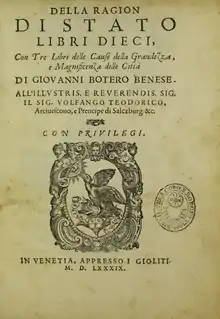The Reason of State
The Reason of State (Italian: Della Ragion di Stato) is a work of political philosophy by Italian Jesuit Giovanni Botero. The book first popularised the term Reason of State[1] and became a political 'bestseller', going through several editions and translations into Spanish, Latin and French in the late sixteenth and the seventeenth century.[2]

Reason of state denotes a way of thinking about government that emerged at the end of the fifteenth century and remained prevalent until the eighteenth century. It refers to the right of rulers to act in ways that go against the dictates of both natural and positive law with the aim of acquiring, preserving, and augmenting the dominion of the state.
The book was first published in Venice in 1589, and is most notable for criticizing methods of statecraft associated with Niccolò Machiavelli and presenting economics as an aspect of politics. Since the beginning of his treatise, Botero claims his determined opposition to machiavellism. He impugns any notion of the reason of State that would be based on immorality, that is on constant transgression of God's prescriptions.[3] The most significant point of departure from Machiavelli's intellectual 'shadow' concerns Botero's warm embrace and strong support of Christianity and the Roman Catholic Church in particular:
The prince must prostrate himself in all humility before the Divine Majesty and acknowledge that from Him proceed the power of a ruler and the obedience of his subjects ... A Christian prince [should not] close the door of his secret council-chamber against Christ and the Gospels and set up a reason of State contrary to God's law, as though it were a rival altar ... So great is the power of religion in government that the state can have no secure foundation without it ... Religion is the mother ... of all the virtues.
— Giovanni Botero, The Reason of State, translated by P.J. Waley and D. P. Waley, New Haven, Yale University Press 1956, p. 63.
In essence, Botero asserts that piety, religion and Roman Catholicism are indispensable parts of any reason of state approach to governing.[4]
In addition to his main work Botero composed a special treatise Delle Cause della Grandezza della Città (On the Causes of the Greatness of Cities), published in 1589 as an appendix to The Reason of State. This is a very remarkable treatise. The causes to which Botero ascribes the increase of cities are mostly identical with those mentioned by Seneca, the influence of each being traced and estimated. But the work is principally worthy of notice from its showing that the author was fully master of all that is really true in the theory of Malthus. This is particularly evinced in his reasonings to show that colonies do not depopulate the mother countries, and in his investigation of the circumstances which limit and determine the growth of cities.[5]
Notes
- Botero was the first to use the term in a book title: Harro Höpfl, Jesuit Political Thought: The Society of Jesus and the State, c.1540–1630 (Cambridge, 2004), p. 84.
- Robert Bireley, The Counter-Reformation Prince: Anti-Machiavellianism or Catholic Statecraft in Early Modern Europe (Chapel Hill, 1990), p. 50.
- Stéphane Bonnet (2003). "Botero machiavélien ou l'invention de la raison d'Etat". Les Études philosophiques (3): 315–329. JSTOR 20849557.
- Artistotle Tziampiris (2009). Faith and Reason of State: Lessons from Early Modern Europe and Cardinal Richelieu. Nova Science Publishers. p. 41. ISBN 9781607419495.
- John Ramsay McCulloch (1845). The Literature of Political Economy: a Classified Catalogue of a Select Publications in the Different Departments of that Science. Longman, Brown. p. 253.